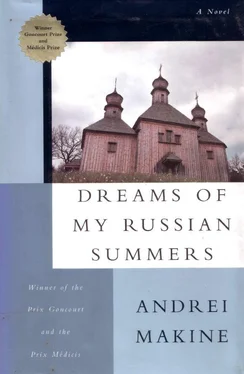Great works of peace are put in hand today:
This mighty arch will rise to lead the way
From this age into that which onward lies,
Linking two peoples and two centuries.
From this historic shore e'er each departs
May French hearts find response in both your hearts.
Before this bridge, sire, dream, and meditate,
Which to thy father France doth consecrate.
Like him, be strong: but merciful thy word;
Keep in its sheath thy battle-glorious sword;
Warrior at peace, bring peace to thine own land.
Tsar, let the spinning world turn in thy hand.
And like thy sire, keep earth in balance still:
Thy powerful arm sustain thy tireless will;
This honor is thy greatest legacy:
To win the love of a people that is free.
"To win the love of a people that is free":
this line, which had initially passed almost unnoticed in the melodious flow of the verses, struck home. The French, a free people… Now we understood why the poet had dared to offer advice to the master of the most powerful empire on earth. And why to be loved by these free citizens was such an honor. On that evening, in the overheated air of the nocturnal steppes, this freedom seemed to us like a harsh and chilly gust from the wind that had made waves on the Seine, and it filled our lungs with a breeze that was heady and a little mad…
Later we would learn to put the ponderous bombast of this declamation into perspective. But at the time, despite its focus on the particular occasion, what we could already detect in his verses was a French je ne sais quoi, which for the moment went without a name. French wit? French politeness? We could not yet say.
Meanwhile the poet turned toward the Seine and held out his hand, gesturing toward the dome of the Hôtel des Invalides on the opposite bank. His rhymed address was coming to a very painful point in the Franco-Russian past: Napoleon, Moscow in flames, the disastrous Berezina crossing… Anxiously, biting our lips, we awaited his voice at this passage so fraught with risk. The tsar's face went blank. Alexandra lowered her eyes. Would it not have been better to pass over it in silence, to pretend nothing had happened and go straight from Peter the Great to the current entente cordiale?
But Heredia seemed to set his sights even higher:
That distant shining dome against the sky
Still shelters heroes from a time gone by,
When French and Russians, jousting without rage,
Mingling their blood, foresaw a future age.
Bewildered, we kept asking ourselves this question: Why do we detest the Germans as much as we do – still recall the Teutonic aggression of seven centuries ago at the time of Alexander Nevski, as well as that of the last war? Why can we never forget the ravages of the Polish and Swedish invaders, ancient history from three and a half centuries ago? Not to mention the Tartars… So why hasn't the memory of the terrible catastrophe of 1812 tarnished the reputation of the French in Russian minds? Is it precisely because of the verbal elegance of that "jousting without rage"?
But the French je ne sais quoi was revealed, above all, as the presence of a woman. Alexandra was there, drawing unobtrusive attention to herself, hailed in every speech in a much less pompous but considerably more elegant manner than her husband. And even within the walls of the Académie Française, where the smell of old furniture and fat, dusty volumes stifled us, this je ne sais quoi allowed her to preserve her femininity. Yes, even among these old men, whom we imagined to be peevish, pedantic, and a little deaf, on account of the hairs in their ears. One of them, the director, rose and with a glum expression declared the session open. Then he fell silent, as if to gather up his thoughts, which, we were sure, would quickly make all his listeners aware of the hardness of their wooden seats. The smell of dust grew thicker. Suddenly the old man lifted his head; a sly twinkle came into his eye, and he spoke: "Sire, Madame! Almost two hundred years ago Peter the Great arrived one day unexpectedly at the place where the members of the Académie were gathered and joined in their deliberations… Your Majesty does even more today: you have added one honor to another by not coming alone." (He turned to the empress.) "Your presence, Madame, will bring to our solemn proceedings something quite unaccustomed… Charm."
Nicholas and Alexandra exchanged rapid glances. And the orator, as if he had sensed that it was time to turn to the main topic, amplified the vibrations in his voice as he asked himself in a highly rhetorical manner: "May I be permitted to say it? Your show of interest addresses not only the Académie but our national language itself… Which for you is not a foreign language. In this we sense a particular desire to enter into more intimate communication with French taste and the French spirit…"
"Our language"! Over the top of the pages that our grandmother was reading out to us, my sister and I looked at one another, struck by the same insight. "… Which for you is not a foreign language." So that was it, the key to our Atlantis! Language, that mysterious substance, invisible and omnipresent, whose sonorous essence reached into every corner of the universe we were in the process of exploring. This language that shaped men, molded objects, rippled in verse, bellowed in streets invaded by crowds, caused a young tsarina who had come from the other end of the world to smile… But above all throbbed within us, like a magical graft implanted in our hearts, already bringing forth leaves and flowers, bearing within it the fruit of a whole civilization. Yes, this implant, the French language.
And it was thanks to this twig blossoming within us that we gained access that evening to the box prepared to welcome the imperial couple at the Comédie Française. We unfolded the program: Un Caprice by Alfred de Musset; fragments from Le Cid; the third act of Les Femmes savantes. At that time we had not read any of those. It was a slight change of timbre in Charlotte s voice that enabled us to grasp the importance of these names for the inhabitants of Atlantis.
The curtain rose. The whole company was onstage in ceremonial roles. The leading player stepped forward, bowed, and spoke of a country that we did not immediately recognize:
Like a vast world, there is a country fair, Whose far horizons never terminate, Whose soul is rich and rare, Great in the past, in future yet more great.
Blond with her corn, white with the white of snow, Leaders and men, her sons walk firm and sure. Let fate smile on her so She harvests gold on virgin earth and pure.
For the first time in my life I was looking at my country from the outside, from a distance, as if I were no longer a part of it. Transported to a great European capital, I looked back to contemplate the immensity of the cornfields and the snow-covered plains by moonlight. I was seeing Russia in French! I was somewhere else. Outside my Russian life. To be thus torn asunder was so painful and at the same time so thrilling that I had to close my eyes. I was afraid of not being able to return to myself, of being stranded in that Parisian evening. Screwing up my eyes, I inhaled deeply. The warm wind of the nocturnal steppe suffused my being once more.
That day I decided to steal her magic from her. I wanted to be one step ahead of Charlotte, to make my way into the festive city before her, join the tsar's entourage without waiting for the hypnotic halo of the turquoise lampshade.
The day was dull, gray – a sad and colorless summer's day, one of those that, amazingly, stay in the memory. The breeze, which smelled of wet earth, billowed out the white net curtains on the open window. The fabric came to life, acquired density, then fell back again, letting someone invisible enter the room.
Читать дальше












